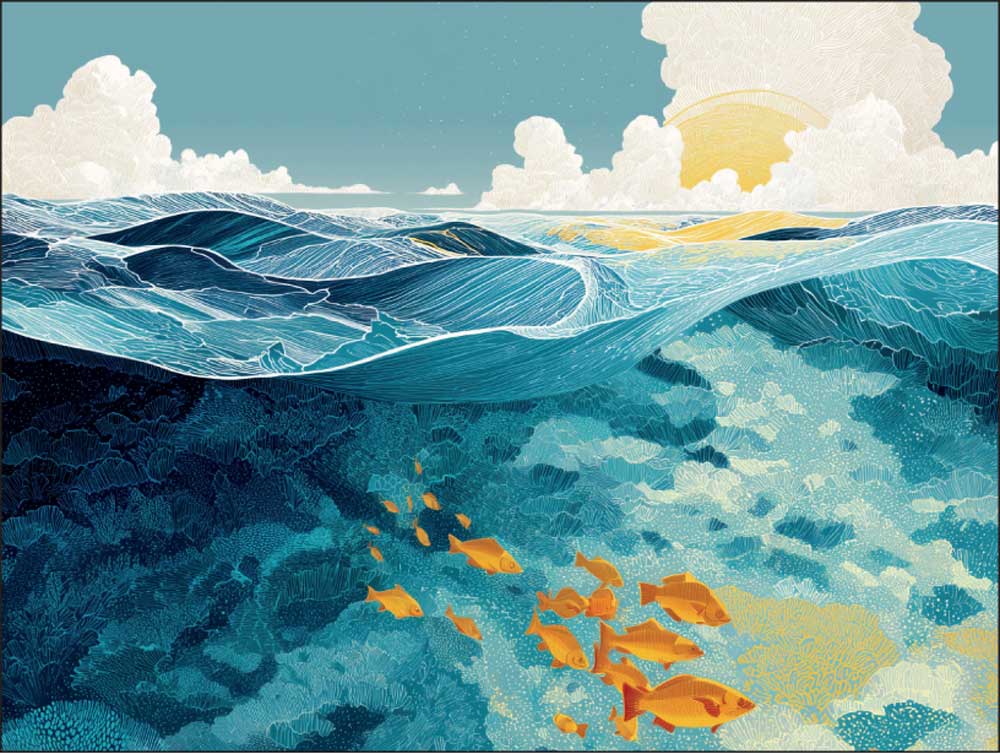Tuesday Feb 17, 2026
Tuesday Feb 17, 2026
Saturday, 5 July 2025 00:10 - - {{hitsCtrl.values.hits}}

The world’s oceans are endangered by the triple planetary crisis, but they also offer significant opportunities for action
 Oceans cover the vast majority of Earth’s surface area and absorb nearly a quarter of global carbon dioxide emissions. They are a major reservoir of biodiversity and home to a variety of highly biodiverse marine and coastal habitats, including mangrove forests, coral reefs, and seagrass meadows. Furthermore, they provide food and livelihoods for billions of people across the globe, with the so-called “blue economy” being estimated at $ 3-6 trillion per year and accounting for more than three quarters of the world’s trade.
Oceans cover the vast majority of Earth’s surface area and absorb nearly a quarter of global carbon dioxide emissions. They are a major reservoir of biodiversity and home to a variety of highly biodiverse marine and coastal habitats, including mangrove forests, coral reefs, and seagrass meadows. Furthermore, they provide food and livelihoods for billions of people across the globe, with the so-called “blue economy” being estimated at $ 3-6 trillion per year and accounting for more than three quarters of the world’s trade.
However, their unique importance for climate change mitigation, adaptation, biodiversity, and human livelihoods simultaneously puts oceans at the centre of the triple planetary crisis: both as a system at risk and as a possible provider of solutions. Especially for island countries such as Sri Lanka, oceans can play an integral part for sustainable economic growth, environmental conservation efforts, and climate action, but only if they are themselves protected from the threats of climate change, biodiversity loss, and pollution.
Currently, the vital services provided by oceans are collapsing under the pressure of climate change and human activities. Over the last 50-100 years, 90% of large predatory fish have vanished. Even with just 1.5°C of global warming, coral reefs could decline by 70-90%. Acidification, algal blooms, and bacterial outbreaks proliferate. For Sri Lanka and many other vulnerable developing countries, these impacts are not abstract science but could unfold into an ecological and livelihood catastrophe.
State of the oceans in 2025
Due to their intricate interconnections with the triple planetary crisis, oceans have featured prominently in the multilateral processes addressing the climate, biodiversity, and pollution crises. They are covered under fourteenth sustainable development goal (life below water) and have their own legal framework under the United Nations Convention on the Law of the Sea (UNCLOS), which entered into force in 1994 and regulates all uses of the oceans. The central importance of oceans will be further highlighted in 2025, which sees several relevant milestones.
First of all, the United Nations Ocean Decade (full name: United Nations Decade of Ocean Science for Sustainable Development) launched in 2021 reaches its midpoint on the way to 2030, following a mission of, inter alia, addressing marine pollution, protection and restoring ecosystems, developing a sustainable, resilient, and equitable ocean economy, and unlocking ocean-based climate solutions. It provides a convening framework for a wide range of stakeholders across the world to engage and collaborate, aiming to trigger “nothing less than a revolution in ocean science.”
Second, the 2025 UN Ocean Conference was held last month last month in Nice, co-hosted by France and Costa Rica with the theme of “accelerating action and mobilizing all actors to conserve and sustainably use the ocean.” Representatives from 175 countries convened to talk about topics of global importance which directly relate to the triple planetary crisis: regulations on deep-sea mining, reduction of plastic waste, and the protection of the high seas outside of any national jurisdiction.
The last two areas also have their own emerging treaties: the Agreement on the Conservation and Sustainable Use of Marine Biological Diversity of Areas beyond National Jurisdiction (BBNJ Agreement) and the international legally binding instrument on plastic pollution, including in the marine environment. For both of these, the next meetings will happen in August, with the second sessions of the BBNJ Preparatory Commission in New York and the second part of the fifth session of the Intergovernmental Negotiating Committee for the global plastic treaty in Geneva.
Embracing complexity
The multilateral legal and policy landscape on oceans is becoming more complex as different aspects—such as the high seas and marine plastic pollution—are tackled by countries around the world. On the one hand, this provides new avenues for action: on the other hand, there is also a danger of jurisdictional overlaps, policy silos, and enforcement vacuum created by fragmented governance arrangements.
Scientific bodies like UNESCO’s Intergovernmental Oceanographic Commission or the Intergovernmental Panel on Climate Change (IPCC) must bridge policy silos and provide evidence and unified metrics for ocean health. Bridging governance gaps also requires the linking of technology (such as satellite imagery) with legal innovation. Furthermore, ocean governance must empower frontline communities and ensure equity and accountability. The complexity of ocean governance does not have to be a barrier but could rather become a foundation for transformation. Making treaties, data streams, and financing more coherent reduces the risk of surrendering the oceans to the very crises that humanity has crafted.
The case for ocean action
The world’s oceans are endangered by the triple planetary crisis, but they also offer significant opportunities for action that brings multiple benefits at once. Healthy oceans not only mean healthy marine and coastal ecosystems—the source of food security and livelihoods for billions—but also a healthy planetary climate. Similarly, reducing plastic pollution in the marine environment not only protects oceanic ecosystems but also human livelihoods and the ocean’s ability to effectively fulfil its function as a climate regulator and carbon sink.
As in any ecosystem, interconnectedness is a key characteristic that countries such as Sri Lanka can embrace to unlock synergies and co-benefits for climate action, biodiversity conservation, and the fight against pollution.
(The writer works as Director: Research & Knowledge Management at SLYCAN Trust, a non-profit think tank. His work focuses on climate change, adaptation, resilience, ecosystem conservation, just transition, human mobility, and a range of related issues. He holds a Master’s degree in Education from the University of Cologne, Germany and is a regular contributor to several international and local media outlets.)